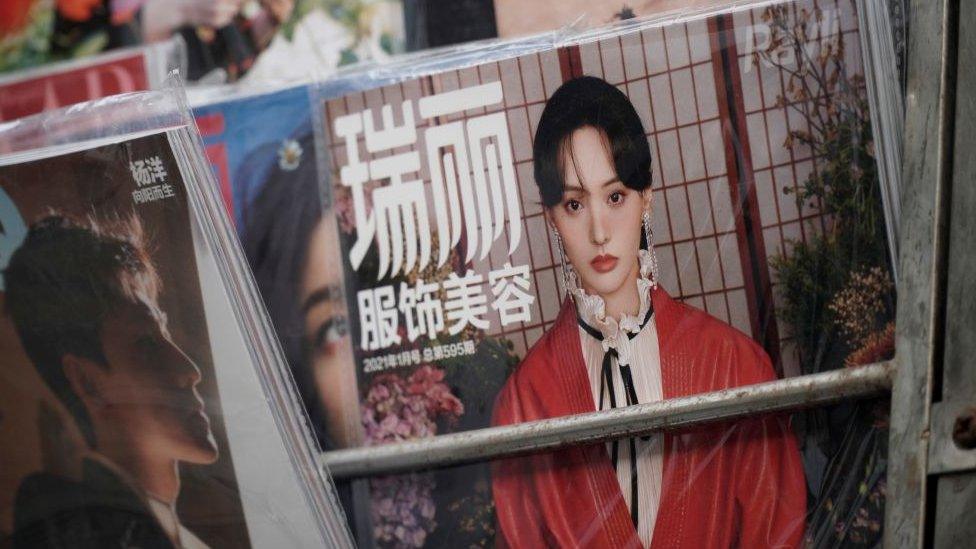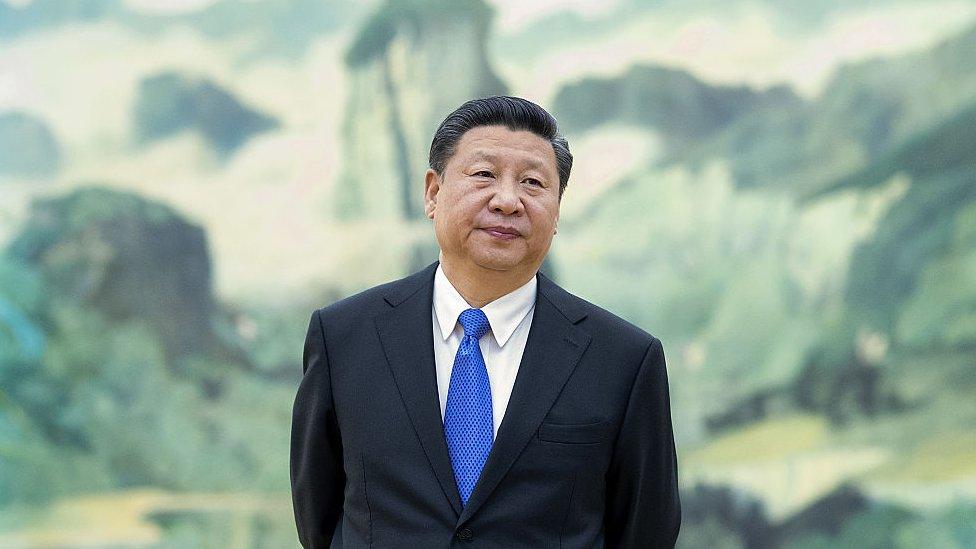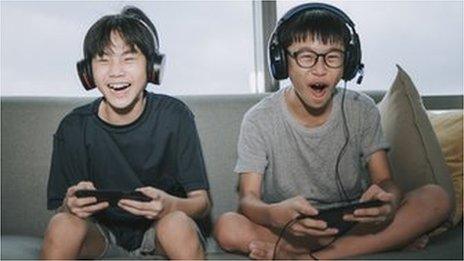China's media cracks down on 'effeminate' styles
- Published

Actors attend the premiere of "Chinese Doctors", as a tribute to the founding of the Communist Party of China
China's broadcasting regulator has said it will ban "effeminate" aesthetics in entertainment shows and that "vulgar influencers" should be avoided.
It's part of a tightening of rules over what it described as "unhealthy content" in programmes.
The National Radio and Television Administration (NRTA) said political and moral conduct should be included as criteria in the selection of actors.
Certain talent contest show formats have also been stopped.
The television regulator also ordered broadcasters to rein in high salaries paid to stars and clamp down on tax evaders.
The authorities pledged to promote what it defined as more masculine images of men and criticised male celebrities who use lots of make up.
However, it said programmes that promoted traditional, revolutionary or "advanced socialist" culture, or foster a patriotic atmosphere, were to be encouraged.
Mass voting for reality programmes will also no longer be allowed unless it is done by live audiences.
Chinese President Xi Jinping has restated the commitment to "common prosperity" and in this pledge to redistribute wealth, high-earning tech tycoons and entertainment stars have been singled out recently. Last week, Chinese actress Zheng Shuang was fined $46m (£33m) for tax evasion.

Last week, Chinese actress Zheng Shuang was fined $46m for tax evasion
Rana Mitter, a professor of the history and politics of modern China at the University of Oxford, said the idea of "common prosperity" was a way of "criticising the immense inequality that now marks society".
"Prominent figures with high wealth are a clear target because criticism of them resonates on social media," he said.
"Having started with tech billionaires, the Party is making it clear that prominent showbiz stars are now another clear target."
Earlier this month, at a meeting of the Chinese Communist party's Central Financial and Economic Affairs Commission, state media reported that while in the early years of China's reform some were enabled to "get rich first", now the government wanted to invoke prosperity "for all". The committee pledged to regulate high earnings in a better way and to "reasonably adjust excessive income".
China has a population of around 1.4 billion people. Income inequality has increased in recent decades, with the 10% of the population earning 41% of the national income in 2015, up from 27% in 1978, as estimated by the London School of Economics. , external

Adjusted for inflation, national income per adult grew more than eightfold between 1978 and 2015, according to official statistics.
Lynette Ong, a professor of political science at the University of Toronto's Asian Institute, said that "this is part of Xi's latest efforts to 'cleanse' what he or the CCP sees as undesirable social culture, such as excessive video gaming by teenagers".
'Chaotic' fan culture
Last week, the country's internet regulator said it would take action against what it called "chaotic" fan culture and banned some fan club sites.
Prof Ong told the BBC that the latest announcements were "evidence of the Party's ever encroaching role into the lives of ordinary people."
In Beijing last month, film stars Zhou Dongyu and Du Jiang warned their contemporaries to never become "slaves of the market" and called on performers to "bravely scale artistic heights under the leadership of the Party".
The entertainment industry is one of the country's most profitable, and in 2021 it is expected to generate revenues of around $358.6bn (£260bn), according to a recent report by consultancy PwC.
In 2019, during further moves on censorship, China blurred out the earlobes of some of its young male pop stars in television and internet appearances to hide their piercings. Tattoos and men's ponytails have also previously been blurred from screens.
The country's official Xinhua News Agency criticised what it termed society's effeminate male celebrities, external in 2018. The agency added: "To cultivate a new generation that will shoulder the responsibility of national rejuvenation, we need to resist erosion from indecent culture."
In China, homosexuality is not illegal but authorities are strict on censorship and edited out gay references in the Oscar winning Freddie Mercury biopic "Bohemian Rhapsody", though they kept many similar references in the movie "Green Book". Nudity and sex scenes were also edited out of widely-viewed series such as "Game of Thrones" and the film "The Shape of Water".

You may also be interested in:
China's changes: Yan Zhigang has spent four decades photographing the streets, and the people, of China
Related topics
- Published25 August 2021

- Published30 August 2021
